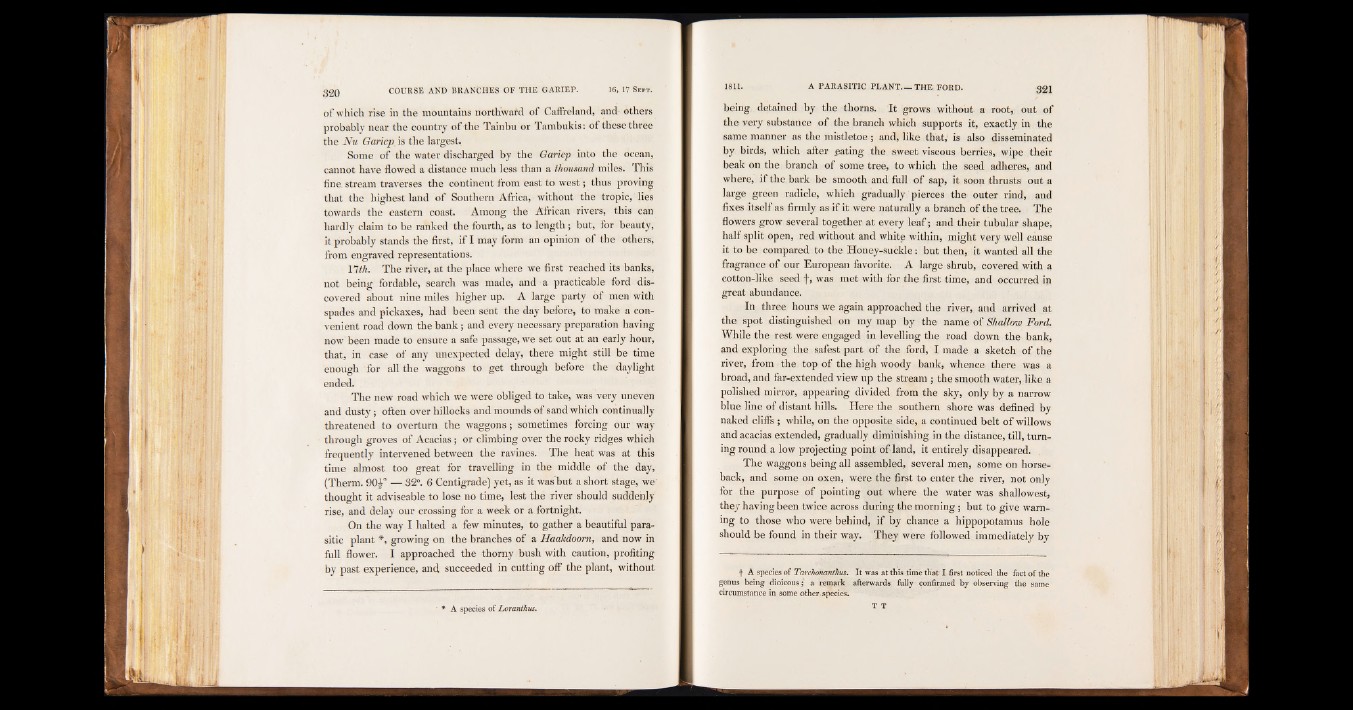
of which rise in the mountains northward of Caffreland, and others
probably near the country of the Tainbu or Tambukis: of these three
the Nu Gariep is the largest.
Some of the water discharged by the Gariep into the ocean,
cannot have flowed a distance much less than a thousand miles. This
fine, stream traverses the continent from east to west; thus proving
that the highest land of Southern Africa, without the tropic, lies
towards the eastern coast. Among the African rivers, this can
hardly claim to be ranked the fourth, as to length; but, for beauty,
it probably stands the first, if I may form an opinion of the others,
from engraved representations.
n th . The river, at the place where we first reached its banks,
not being fordable, search was made, and a practicable ford discovered
about nine miles higher up. A large party of men with
spades and pickaxes, had been sent the day before, to make a convenient
road down the bank; and every necessary preparation having
now been made to ensure a safe passage, we set out at an early hour,
that, in case of any unexpected delay, there might still be time
enough for all the waggons to get through before the daylight
ended.
The new road which we were obliged to take, was very uneven
and dusty; often over hillocks and mounds of sand which continually
threatened to overturn the waggons; sometimes forcing our way
through groves of Acacias ; or climbing over the rocky ridges which
frequently intervened between the ravines. The heat was at this
time almost too great for travelling in the middle of the day,
(Therm. 90£” — 32°. 6 Centigrade) yet, as it was but a short stage, we
thought it adviseable to lose no time, lest the river should suddenly
rise, and delay our crossing for a week or a.fortnight.
On the way I halted a few minutes, to gather a beautiful parasitic
plant *, growing on the branches of a HaaJcdoom, and now in
full flower. I approached the thorny bush with caution, profiting
by past experience, and succeeded in cutting off the plant, without
* A species of Loranthus.
being detained by the thorns. It grows without a root, out of
the very substance of the branch which supports it, exactly in the
same manner as the mistletoe; and, like that, is also disseminated
by birds, which after pating the sweet viscous berries, wipe their
beak on the branch of some tree, to which the seed adheres, and
where, if the bark be smooth and full of sap, it soon thrusts out a
large green radicle, which gradually pierces the outer rind, and
fixes itself as firmly as if it were naturally a branch of the tree. The
flowers grow several together at every leaf; and their tubular shape,
half split open, red without and white within, might very well cause
it to be compared to the Honey-suckle: but then, it wanted all the
fragrance of our European favorite. A large shrub, covered with a
cotton-like seed f , was met with for the first time, and occurred ip
great abundance.
In three hours we again approached the river, and arrived at
the spot distinguished on my map by the name of Shallow Ford.
While the rest were engaged in levelling the road down the bank,
and exploring the safest part of the ford, I made a sketch of the
river, from the top of the high woody bank, whence there was a
broad, and far-extended view up the stream ; the smooth water, like a
polished mirror, appearing divided from the sky, only by a narrow
blue line of distant hills. Here the southern shore was defined by
naked cliffs ; while, on the opposite side, a continued belt of willows
and acacias extended, gradually diminishing in the distance, till, turning
round, a low projecting point of land, it entirely disappeared.
The waggons being all assembled, several men, some on horseback,
and some on oxen, were the first to enter the river, not only
for the purpose of pointing out where the water was shallowest,
they having been twice across during the morning; but to give warning
to those who were behind, if by chance a hippopotamus hole
should be found in their way. They were followed immediately by
f A species of Tarchonanthus. I t was at this time that I -first noticed the fact of the
genus being dioicous; a remark afterwards fully confirmed by observing the same
circumstance in some other.species.
T T